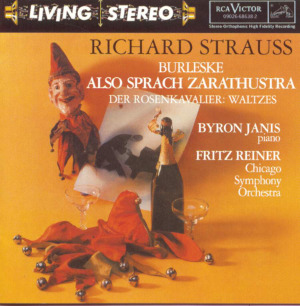
Richard Strauss (1864-1949)
Also sprach Zarathustra, Op. 30*
Burleske in D minor, TrV 145
Der Rosenkavalier Waltzes
Byron Janis (piano)
Chicago Symphony Orchestra/Fritz Reiner
rec. 1957/1962*, Orchestra Hall, Chicago
Presto CD
RCA 9029 686382 [63]
These “Living Stereo” recordings have always been of high quality both aesthetically and sonically; I have them as part of the 5 CD box set of Reiner’s Strauss on RCA Sony which is indicated as 24-bit resolution whereas this individual disc says 20-bit; I can hear no difference and both are excellent. Hiss is minimal and there is no peakiness or harshness on loud, high notes, with a minimum of congestion in ensemble.
The performance itself of Also sprach Zarathustra is simply stunning – one to match and sit proudly alongside Karajan’s BPO version, or Ormandy with the Philadelphians in 1975, or Previn with the VPO, or Maazel with the BRSO or…the list of great recordings goes on, and I can only assert that anyone experiencing this music for the first time via this recording will not be short-changed. In his 2014 review of Pristine’s XR remastering of Reiner’s earlier, 1954 recording of Zarathustra with the same orchestra and with the same recording as per here of the Burleske, John Quinn pronounced it to be henceforth his preferred issue, but both the 1954 and the 1962 recordings are superlative. Reiner has his crack band – especially the celebrated brass section – really let rip, but despite his reputation for drive and rigour – similar to Solti’s – he is as lyrical as any interpreter in the “Dance” and “Night” song sections (penultimate track) and the “Night Wanderer’s Song”, which brings this mighty score to a close, is mysterious and hieratic.
Strauss-devotee though I am, I am with JQ in that the noisy Burleske has never been a favourite score but I readily acknowledge that the performance of it here with Byron Janis as soloist is as fine as any. It is essentially a single-movement, twenty-minute concerto and the music is often hard, angular and percussive, but interspersed with Lisztian rhapsodic passages; Janis is fully up to encompassing the range of moods, producing both delicate and thunderous tone – although the recording makes piano sound much more forward in the sound picture than it could be in live performance if you were in the audience.
Reiner’s own arrangement of the Rosenkavalier waltzes is a bon-bon bonus; there is first the thrill of recognition as the Chicago horns whoop that famous fanfare, then we sit back and luxuriate for another eight minutes in a seamless, languorous, three-quarter-time outpouring of melody culminating in a riotous conclusion. What’s not to love?
Ralph Moore
Help us financially by purchasing from

Note: This recording of Also sprach Zarathustra has also been issued by Presto as a download coupled with Ein Heldenleben if you prefer that pairing, and is available on their website (Catalogue No: 09026614942).


















